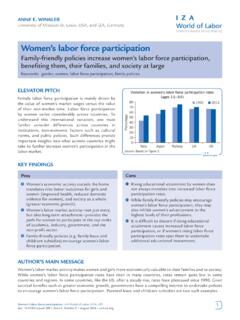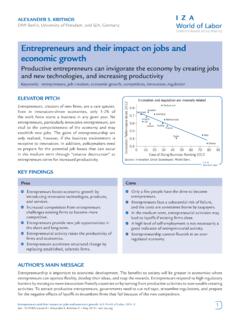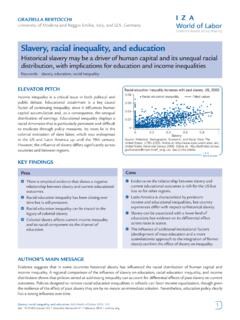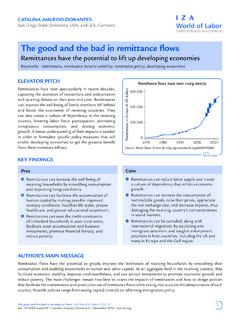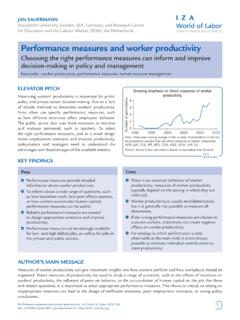Transcription of Immigrants differ in their language proficiency along a ...
1 Ingo E. IsphordIngIZA, GermanyWhat drives the language proficiency of Immigrants ? IZA World of Labor 2015: 177d o i: 5/ i z aw o 7 | Ingo E. Isphording | August 2015 | pros Immigrants arriving during childhood effortlessly acquire the primary language of the host country. language skills increase with time spent in the destination country through exposure and learning by doing. Higher wage returns and better job opportunities create incentives to invest in the acquisition of languages. Point-based immigration selection rules, language classes, and citizenship incentives are policy options that can be used to encourage language pITChLanguage proficiency is a key driver of immigrant integration.
2 It increases job opportunities and facilitates social and political participation. However, despite its vital importance, many Immigrants never reach adequate proficiency in the host country language . Therefore, insights into the underlying processes and associated factors are crucial for designing measures to improve language acquisition. Empirical evidence shows that Immigrants differ in their ability to learn languages, in their experience of everyday language usage, and their incentives to learn host country languages. This offers a range of opportunities for public policy s MAIn MEss AgEImmigrants who fail to achieve adequate proficiency in the host country language generally fail to achieve economic and social integration.
3 The language skills of Immigrants differ along a range of observable and unobservable characteristics. language skills increase with the time spent in the host country and in response to higher wage and job incentives. Insights into differences in immigrant characteristics offer opportunities for public policy intervention to improve integration through better language acquisition. Promising policy options include point-based immigration selection rules, language classes, and citizenship Greater linguistic distance between the native language and the host country language increases the difficulty and cost of language acquisition. Living in ethno-linguistic enclaves reduces exposure to the host country language and thus opportunities to use it regularly.
4 Circular migration and short expected durations of stay decrease incentives for language acquisition. The efficiency of language acquisition is also influenced by characteristics that are not observed in the data and can only be approximated, such as motivation and cognitive drives the language proficiency of Immigrants ? Immigrants differ in their language proficiency along a range of characteristicsKeywords: Immigrants , language proficiency , integrationKEY FIndIngsLanguage skills increase in the first years after of speakingEnglish well/very well012345678910 Years since migrationSource: Based on Figure World of Labor | August 2015 | E. IsphordIng | What drives the language proficiency of Immigrants ?
5 MoTIVATIonBeing able to communicate in the host country language is one of the main drivers of successful economic and social integration of Immigrants . Low levels of language proficiency create high hurdles to participating in the labor market, joining in the political process, and engaging in everyday social interaction. Having adequate language skills allows Immigrants to progress along the job ladder, increases their employment probability, and eases their access to better-paying jobs. Despite the importance of language acquisition, proficiency levels remain low among large segments of immigrant populations. Understanding the underlying processes of language acquisition and the factors associated with acquiring proficiency is vital for designing effective policy measures to increase language acquisition and economic and social integration of Immigrants .
6 This paper surveys the empirical literature on factors associated with language acquisition and links this evidence to potential policy Ion o F pros And ConsWhy acquiring proficiency in the host country language is importantLanguage skills are a vital part of an immigrant s human capital. Acquiring adequate proficiency in the host country language is an important driver of immigrant economic and social integration. The importance of language proficiency for successful labor market integration stems from at least two distinct roles of language , as the primary medium of communication, language skills are a productive trait in themselves, and employers are willing to reward the higher productivity of workers who are language proficient.
7 This wage effect of language skills combines a direct effect of being remunerated for higher productivity and an indirect effect of having easier access to well-paid, communication-intensive jobs, thus preventing occupational , language skills are complementary to the education and experience acquired before migration and facilitate the transfer of these skills into the new job environment. language skills also ease the acquisition of additional education and experience in the host country. The influence of language skills extends beyond the economic success of Immigrants . In addition to helping Immigrants integrate into the labor market, language skills also crucially affect such non-market outcomes as education, health, marriage, social integration, and political the importance of language acquisition, proficiency levels remain low for large segments of the immigrant population.
8 Low language proficiency is often highlighted as a contributor to failed integration, and it can fuel anti-immigration attitudes. Nonetheless, some Immigrants do gain adequate proficiency in the host country language . Thus, it is of great concern to identify the driving influences and associated factors behind immigrant decisions to invest in acquiring host country language skills and understand why some Immigrants learn the host country language and others do World of Labor | August 2015 | E. IsphordIng | What drives the language proficiency of Immigrants ? Factors contributing to Immigrants acquisition of the host country language Economists tend to interpret proficiency in the host country language as part of an immigrant s human capital.
9 As such, it is costly to acquire, inseparably connected to the individual, and generates higher labor market returns through increased productivity. In deciding on optimal effort and commitment to acquire language skills, Immigrants trade off the expected benefits of language proficiency and the costs of benefits of language acquisition arise through the rewards of higher earnings, better employment probabilities, access to better jobs, and achievement of non-market gains through social and political participation. The costs of language skill acquisition include effort, time, the cost of language classes, and the indirect costs of forgone earnings (opportunity costs) while learning the language .
10 Both the benefits and the costs of language acquisition are related to observable influencing factors. In seminal work on this issue, the determinants were classified into three groups: those shaping the ability and efficiency of acquiring a new language , those affecting the degree to which Immigrants are exposed to the host country language , and those that set economic incentives for acquiring the language [1].Ability and efficiency in learning a new languageThe first group of influencing factors affects the efficiency of learning a new language . Immigrants differ in how much of an investment in resources (time, money, effort) they need to make in order to reach a certain level of language proficiency .
